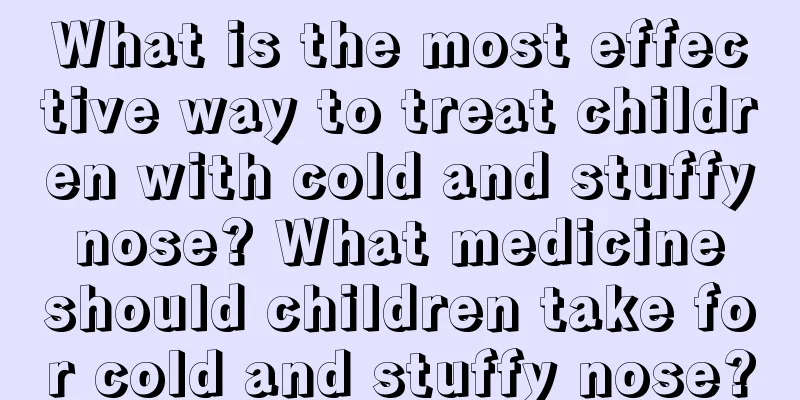Can you pinch a baby's face? What are the harms of pinching a baby's face?

|
Pinching a baby's face frequently is harmful to the baby, because the baby's facial skin is relatively thin and tender, and many organs are not fully developed. Pinching a baby's face frequently is very bad, so everyone remember to restrain themselves. Can you pinch a baby's face?Although a baby's face is chubby and cute, you should not pinch it. If you pinch the baby's face frequently, it will have a certain impact on the baby, so don't show your love for the baby by pinching the face. The harm of pinching a baby's face1. Baby's cheek fat pad is easily injured There is a special kind of fat tissue under the baby's cheek skin - the buccal fat pad. The buccal fat pad makes the baby's face look chubby and at the same time, it also coordinates the upper palate, cheeks, lips and tongue when the baby sucks and chews. Experts say that people's saliva is secreted by the parotid glands in the mouth. If the baby's face is often pinched, it will easily affect the development of the parotid glands and increase the child's saliva secretion. If the child has not learned to swallow, too much saliva will flow out. 2. Saliva causes skin eczema Generally speaking, children will secrete a lot of saliva when they are 4 months old, and they will start to grow teeth at around 7 months old. At this time, children will often drool. However, if family members pinch the child's face too many times, it will stimulate the development of the parotid gland, which will cause the child to secrete more saliva, drooling, and even drooling a lot in the next few months. The human body's saliva contains some digestive acid. When saliva flows to the skin, it is easy to corrode the outermost stratum corneum of the skin, causing symptoms such as eczema and inflammation. This is the reason why many babies who drool have redness and rashes around their mouths. Therefore, when the baby drools, it must be wiped dry in time and cleaned frequently. 3. Affect the baby's facial development The baby's bones are very fragile, and frequent kneading will affect the normal development of the facial bones. For example, frequent twisting of the cheeks may cause asymmetrical development of the baby's left and right jaws, resulting in a crooked or uneven face, which seriously affects facial development. How to prevent others from pinching your baby's face1. Direct method If it is someone you know, you can directly say "Please don't pinch the baby's face all the time, it will make the baby look ugly and cause eczema." If it is someone you don't know well, you can say "Please don't pinch the baby's face, you can hold her hand." Or, you can casually hold the baby and spin around, and say with a smile, "Look how much grandma likes you, I want to pinch your little face, tell grandma I'm afraid of sweating, so I won't let you pinch it." 2. Euphemism Say to them in a kind and baby-like tone, "Thank you grandpa and grandma for loving me so much, but if you pinch them too much, they will drool and it won't look good." I believe they will understand, and open-minded people won't mind. You can also do this: when someone pinches the baby, you deliberately ask, "I heard that pinching the cheeks will make you drool, do you think it will..." But be careful with your tone. 3. Transfer method After others have finished praising you, turn the baby's face towards you: "Come, auntie said that the baby is getting fat. Mommy came to see if he is fat." In this way, the baby's face will not be facing others, so others will not have the "opportunity to take advantage of it", and the attention will be cleverly diverted. Ways to reduce your baby's drooling1. Add complementary food scientifically Increased saliva will occur when children add complementary foods. At this time, mothers should take advantage of the child's digestive rules and add food to the baby in order of softness and hardness. The baby's oral muscles will be effectively exercised, especially the swallowing and chewing movements can be improved. Excessive saliva is related to the baby's spleen. Mothers can mash hawthorn or red beans and add them to the child's food, which can regulate the spleen and reduce saliva. 2. Exercise sucking ability Parents can use pacifiers to train their children's sucking ability, which can reduce the amount of saliva retained in the mouth and may also reduce stimulation to the salivary glands. 3. Use teething objects When a child's teeth are erupting, the teeth will swell and the saliva will increase. At this time, parents can also use teething objects to relieve the child's discomfort and reduce the outflow of saliva, which is also beneficial for the eruption of deciduous teeth. |
<<: Can I eat biscuits while breastfeeding? What snacks can I eat after giving birth?
>>: What are the benefits of rice noodles for babies? How to brew rice noodles
Recommend
What's wrong with my baby who always rubs his eyes with his hands? How to deal with itchy eyes?
Many careful mothers will find that babies love t...
Will sex hurt after giving birth? Will women's sexual desire increase after giving birth?
After giving birth, a woman's body has been t...
What should I do if my baby doesn't get along with others in kindergarten and always plays alone?
Babies will be happy when they play with other ch...
Can eating daylily increase milk production? Can pregnant women eat daylily?
Daylily, whether fresh or dried, has a unique fra...
What should pregnant mothers pay attention to when soaking their feet in autumn? What should pregnant mothers pay attention to when bathing?
As the weather gradually cools down and becomes c...
What can't the mother eat for baby's intestinal flatulence? What medicine can the baby take for intestinal flatulence?
It is normal for babies to have flatulence. Many ...
At what age does a baby's intellectual development complete?
Parents love smart babies, and mothers should pay...
What foods are good for children with myopia to prevent myopia from getting worse?
Nowadays, the age group with vision problems is g...
Can postpartum repair be done at home? Can postpartum repair improve sagging?
For mothers who have just given birth, postpartum...
When can NT examination be done? When is the most accurate time for NT examination?
Everyone must have heard of NT examination, but d...
What should I use to cut baby's nails? Do I need special tools to cut baby's nails?
How to cut baby's nails? This is a question f...
What are the reasons why babies suddenly don't like to eat milk?
It is very common for babies to breastfeed. Somet...
What is the best temperature to set the air conditioner at during the confinement period in winter? What is the appropriate temperature to set the air conditioner at in winter?
When you are in confinement in winter, mothers sh...
Are Vinda wet wipes safe? Can Vinda wet wipes be used to wipe the face?
Nowadays, wet wipes are basically prepared at hom...
Is the American Arm&Hammer baking soda toothpaste good to use?
Toothpaste is a common cleaning product that we u...









